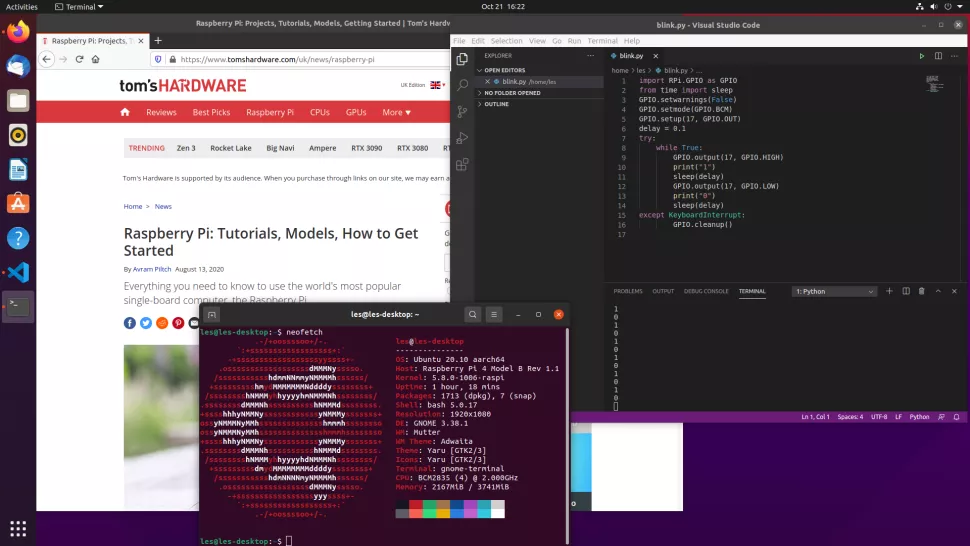
Ubuntu 20.10 "Groovy Gorilla" distribution appeared on the Ubuntu download page yesterday . Its support will continue until July 2021. New images are created in the following editions: Ubuntu, Ubuntu Server, Lubuntu, Kubuntu, Ubuntu Mate, Ubuntu Budgie, Ubuntu Studio, Xubuntu, and UbuntuKylin (China edition).
In addition, for the first time on the day of the Ubuntu release, the developers have posted a specialized release for the Raspberry Pi. Moreover, this is a full-fledged desktop distribution , and not a server version with a shell, as in the case of previous versions. In general, now with "raspberry" Ubuntu works out of the box.
What's new in Ubuntu 20.10?
- — . , GNOME 3.38, Linux — 5.8. GCC 10, LLVM 11, OpenJDK 11, Rust 1.41, Python 3.8.6, Ruby 2.7.0, Perl 5.30, Go 1.13 PHP 7.4.9. LibreOffice 7.0. , glibc 2.32, PulseAudio 13, BlueZ 5.55, NetworkManager 1.26.2, QEMU 5.0, Libvirt 6.6.
- nftables . , — iptables-nft, , iptables.
- Ubiquity Active Directory.
- popcorn, , , . Popcorn Ubuntu 2006 , , , , , .
- Ubuntu Server, Active Directory adcli realmd, SMB3, IMAP- Dovecot, Liburing Telegraf.
- . , KVM initramfs ( - initramfs).
- Kubuntu KDE Plasma 5.19, KDE Applications 20.08.1 Qt 5.14.2. Elisa 20.08.1, latte-dock 0.9.10, Krita 4.3.0 Kdevelop 5.5.2.
- . , « » . .
- Ubuntu Studio KDE Plasma . Xfce. KDE Plasma , Wacom.
- Xubuntu, Parole Media Player 1.0.5, Thunar File Manager 1.8.15, Xfce Desktop 4.14.2, Xfce Panel 4.14.4, Xfce Terminal 0.8.9.2, Xfce Window Manager 4.14.5 ..
Raspberry Pi

To install Ubuntu 20.10, you need a memory stick, Balena Etcher, or Raspberry Pi Imager. It is advisable to use a 16 GB card. The OS itself is 64-bit, so it will work fine on a 4GB or 8GB Raspberry Pi.
At the first stage, the installer will ask a series of questions that will determine the progress of the process - everything is familiar here. Once installed, Groovy Gorilla will show itself in all its glory. Users who are familiar with Ubuntu can easily understand the interface and find many familiar elements, applications, etc.
One of the positive aspects is that using this OS you can make an access point from the Raspberry Pi. Perhaps this opportunity will come in handy for someone.
By the way, the wireless connection in the Ubuntu - Raspberry Pi bundle works fine. It has already been said above that the OS works out of the box, supporting all the functions of the "raspberry" - so it really is. Users who have already tested the system say that there are no problems with communication. "Not a single gap", as they say in the golden quotation book of Runet.
In addition to wireless communication, the Raspberry Pi Camera also works great - both a regular and an HQ camera, which only recently appeared on sale, were tested in the system .
An important point - GPIO also works without problems in Ubuntu 20.10.

But by default, there are no tools for working with GPIO, so to get the ability to work with GPIO for Python, you need to install the RPi.GPIO module. You can usually use pip, but in this case you need to use a package from the apt repositories.
After installation, it is worth checking the operation of the GPIO using Python 3 and the imported module - you can test it by controlling the LED. Everything works, only sudo is required. This is not ideal, of course, but so far there is no other way out.
Now about performance and video playback support. Unfortunately, in conjunction with Ubuntu, the "raspberry" does not produce normal quality. The WebGL Aquarium test shows 15 frames per second with just one object. For 100 objects, fps drops to 14, and for 500 objects - to 10.
But hardly anyone buys a "Malinka" in order to watch videos in 4K quality with it, right? For everything else, its capabilities are enough with the head - even for recognizing images in a video stream. Soon we will publish an article on testing raspberries in conjunction with image recognition and machine learning.
If you suddenly missed the news on the release of Raspberry Computing Module 4, you can see what it is and how it works here .
